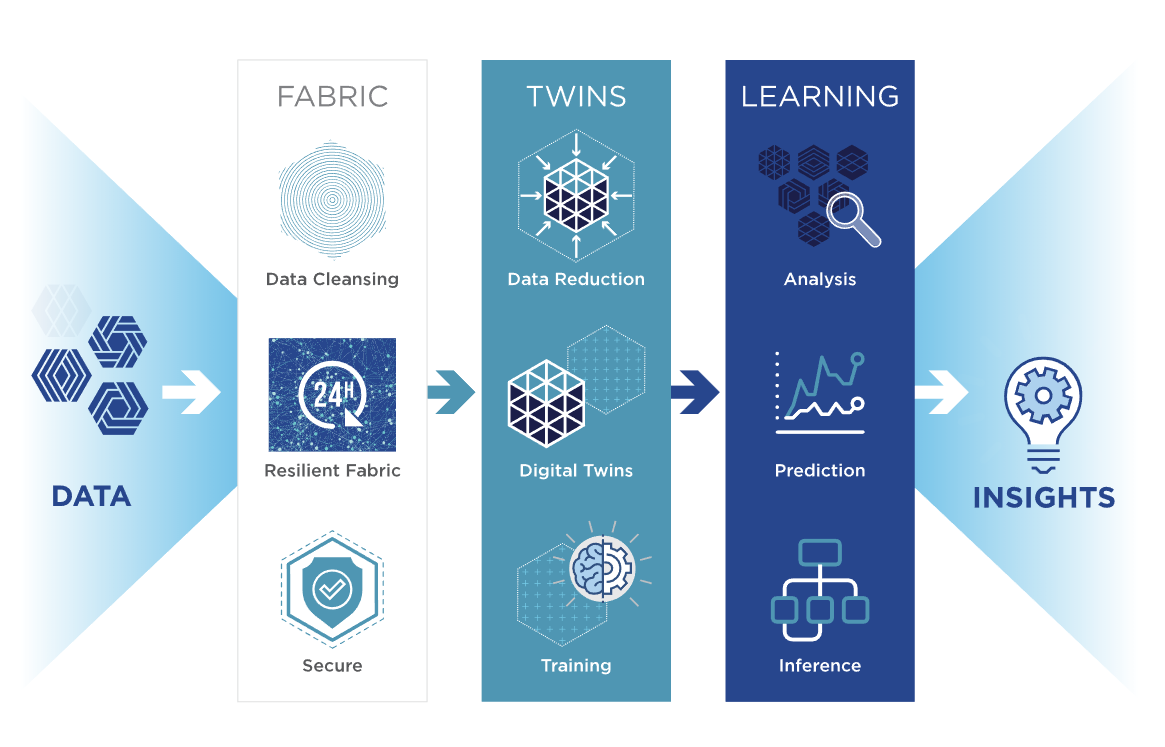Recent Funding
Auto Added by WPeMatico
Auto Added by WPeMatico
Cogito announced a $37 million Series C investment today led by Goldman Sachs Growth Equity. Previous investors Salesforce Ventures and OpenView also chipped in. Mark Midle of Goldman Sachs’ Merchant Banking Division, has joined Cogito’s Board of Directors
The company has raised over $64 million since it emerged from the MIT Human Dynamics Lab back in 2007 trying to use the artificial intelligence technology available at the time to understand sentiment and apply it in a business context.
While it took some time for the technology to catch up with the vision, and find the right use case, company CEO and founder Joshua Feast says today they are helping customer service representatives understand the sentiment and emotional context of the person on the line and give them behavioral cues on how to proceed.
“We sell software to very large software, premium brands with many thousands of people in contact centers. The purpose of our solution is to help provide a really wonderful service experience in moments of truth,” he explained. Anyone who deals with a large company’s customer service has likely felt there is sometimes a disconnect between the person on the phone and their ability to understand your predicament and solve your problem.

Cogito in action giving customer service reps real-time feedback.
He says using his company’s solution, which analyzes the contents of the call in real time, and provides relevant feedback, the goal is to not just complete the service call, but to leave the customer feeling good about the brand and the experience. Certainly a bad experience can have the opposite effect.
He wants to use technology to make the experience a more human interaction and he recognizes that as an organization grows, layers of business process make it harder for the customer service representative to convey that humanity. Feast believes that technology has helped create this problem and it can help solve it too.
While the company is not talking about valuation or specific revenue at this point, Feast reports that revenue has grown 3X over the last year. Among their customers are Humana and Metlife, two large insurance companies, each with thousands of customer service agents.
Cogito is based in downtown Boston with 117 employees at last count, and of course they hope to use the money to add on to that number and help scale this vision further.
“This is about scaling our organization to meet client’s needs. It’s also about deepening what we do. In a lot of ways, we are only scratching the surface [of the underlying technology] in terms of how we can use AI to support emotional connections and help organizations be more human,” Feast said.
Powered by WPeMatico
Once upon a time, it looked like cloud-based serviced would become the central hub for analyzing all IoT data. But it didn’t quite turn out that way because most IoT solutions simply generate too much data to do this effectively and the round-trip to the data center doesn’t work for applications that have to react in real time. Hence the advent of edge computing, which is spawning its own ecosystem of startups.
Among those is Swim.ai, which today announced that it has raised a $10 million Series B funding round led by Cambridge Innovation Capital, with participation from Silver Creek Ventures and Harris Barton Asset Management. The round also included a strategic investment from Arm, the chip design firm you may still remember as ARM (but don’t write it like that or their PR department will promptly email you). This brings the company’s total funding to about $18 million.
Swim.ai has an interesting take on edge computing. The company’s SWIM EDX product combines both local data processing and analytics with local machine learning. In a traditional approach, the edge devices collect the data, maybe perform some basic operations against the data to bring down the bandwidth cost and then ship it to the cloud where the hard work is done and where, if you are doing machine learning, the models are trained. Swim.ai argues that this doesn’t work for applications that need to respond in real time. Swim.ai, however, performs the model training on the edge device itself by pulling in data from all connected devices. It then builds a digital twin for each one of these devices and uses that to self-train its models based on this data.

“Demand for the EDX software is rapidly increasing, driven by our software’s unique ability to analyze and reduce data, share new insights instantly peer-to-peer – locally at the ‘edge’ on existing equipment. Efficiently processing edge data and enabling insights to be easily created and delivered with the lowest latency are critical needs for any organization,” said Rusty Cumpston, co-founder and CEO of Swim.ai. “We are thrilled to partner with our new and existing investors who share our vision and look forward to shaping the future of real-time analytics at the edge.”
The company doesn’t disclose any current customers, but it is focusing its efforts on manufacturers, service providers and smart city solutions. Update: Swim.ai did tell us about two customers after we published this story: The City of Palo Alto and Itron.
Swim.ai plans to use its new funding to launch a new R&D center in Cambridge, UK, expand its product development team and tackle new verticals and geographies with an expanded sales and marketing team.
Powered by WPeMatico
Zoox, a once-secretive self-driving car startup, is closing a $500 million raise at a $3.2 billion post-money valuation, Bloomberg Businessweek reports. Prior to the deal, Zoox was valued at $2.7 billion, Zoox confirmed to TechCrunch. The round, led by Mike Cannon-Brookes of Grok Ventures, brings its total amount of funding to $800 million.
Zoox’s plan, according to Bloomberg, is to publicly deploy autonomous vehicles by 2020 in the form of its own ride-hailing service. The cars themselves will be all-electric and fully autonomous. Meanwhile, ride-hail companies like Uber and Lyft are also working on autonomous vehicles, as well as a number of other large players in the space.
Zoox, which turned four years old this month, is a 500-person company founded by Tim Kentley-Klay and Jesse Levinson. In the meantime, head over to Bloomberg for the full rundown.
Powered by WPeMatico
Dialpad announced a $50 million Series D investment today, giving the company plenty of capital to keep expanding its business communications platform.
The round was led by Iconiq Capital with help from existing investors Andreessen Horowitz, Amasia, Scale Ventures, Section 32 and Work-Bench. With today’s round, the company has now raised $120 million.
As technology like artificial intelligence and internet of things advances, it’s giving the company an opportunity to expand its platform. Dialpad products include UberConference conferencing software and VoiceAI for voice transcription applications.
The company is competing in a crowded market that includes giants like Google and Cisco and a host of smaller companies like GoToMeeting (owned by LogMeIn), Zoom and BlueJeans. All of these companies are working to provide cloud-based meeting and communications services.
Increasingly, that involves artificial intelligence like natural language processing (NLP) to provide on the fly transcription services. While none of these services is perfect yet, they are growing increasingly accurate.
VoiceAI was launched shortly after Dialpad acquired TalkIQ in May to take this idea a step further by applying sentiment analysis and analytics to voice transcripts. The company plans to use the cash infusion to continue investing in artificial intelligence on the Dialpad platform.

Post call transcript generated by VoiceAI. Screenshot: Dialpad
CEO Craig Walker certainly sees the potential of artificial intelligence for the company moving forward. “Smart CIOs know AI isn’t just another trendy tech tool, it’s the future of work. By arming sales and support teams, and frankly everybody in the organization, with VoiceAI’s real-time artificial intelligence and insights, businesses can dramatically improve customer satisfaction and ultimately their bottom line,” Walker said in a statement.
Dialpad is also working with voice-driven devices like the Amazon Alexa and it announced Alexa integration with Dialpad in April. This allows Alexa users to make calls by saying something like, “Alexa, call Liz Green with Dialpad” and the Echo will make the phone call on your behalf using Dialpad software.
According to the company website, it has over 50,000 customers including WeWork, Stitch Fix, Uber and Reddit. The company says it has added over 10,000 new customers since its last funding round in September, 2017.
Powered by WPeMatico
Need to resize a video for IGTV? Add subtitles for Twitter? Throw in sound effects for YouTube? Or collage it with other clips for the Instagram feed? Kapwing lets you do all that and more for free from a mobile browser or website. This scrappy new startup is building the vertical video era’s creative suite full of editing tools for every occasion.
Pronounced “Ka-pwing,” like the sound of a ricocheted bullet, the company was founded by two former Google Image Search staffers. Now after six months of quiet bootstrapping, it’s announcing a $1.7 million seed round led by Kleiner Perkins.

Kapwing hopes to rapidly adapt to shifting memescape and its fragmented media formats, seizing on opportunities like creators needing to turn their long-form landscape videos vertical for Instagram’s recently launched IGTV. The free version slaps a Kapwing.com watermark on all its exports for virality, but users can pay $20 a month to remove it.
While sites like Imgur and Imgflip offer lightweight tools for static memes and GIFs, “the tools and community for doing that for video are kinda inaccessible,” says co-founder and CEO Julia Enthoven. “You have something you install on your computer with fancy hardware. You should able to create and riff off of people,” even if you just have your phone, she tells me. Indeed, 100,000 users are already getting crafty with Kapwing.
“We want to make these really relevant trending formats so anyone can jump in,” Enthoven declares. “Down the line, we want to make a destination for consuming that content.”

Kapwing co-founders Eric Lu and Julia Enthoven
Enthoven and Eric Lu both worked at Google Image Search in the lauded Associate Product Manager (APM) program that’s minted many future founders for companies like Quip, Asana and Polyvore. But after two years, they noticed a big gap in the creative ecosystem. Enthoven explains that “The idea came from using outdated tools for making the types of videos people want to make for social media — short-form, snackable video you record with your phone. It’s so difficult to make those kinds of videos in today’s editors.”
So the pair of 25-year-olds left in September to start Kapwing. They named it after their favorite sound effect from the Calvin & Hobbes comics when the make-believe tiger would deflect toy gunshots from his best pal. “It’s an onomatopoeia, and that’s sort of cool because video is all about movement and sound.”

After starting with a meme editor for slapping text above and below images, Kapwing saw a sudden growth spurt as creators raced to convert landscape videos for vertical IGTV. Now it has a wide range of tools, with more planned.
The current selection includes:

Kapwing definitely has some annoying shortcomings. There’s an 80mb limit on uploads, so don’t expect to be messing with much 4K videos or especially long clips. You can’t subtitle a GIF, and the meme maker flipped vertical photos sideways without warning. It also lacks some of the slick tools that Snapchat has developed, like a magic eraser for Photoshopping stuff out and a background changer, or the automatic themed video editing found in products like Google Photos.
The No. 1 thing it needs is a selective cropping tool. Instead of letting you manually move the vertical frame around inside a landscape video so you always catch the action, it just grabs the center. That left me staring at blank space between myself and an interview subject when I uploaded this burger robot startup video. It’s something apps like RotateNFlip and Flixup already offer. Hopefully the funding that also comes from Shasta, Shrug Capital, Sinai, Village Global, and ZhenFund will let it tackle some of these troubles.

Beyond meme-loving teens and semi-pro creators, Kapwing has found an audience amongst school teachers. The simplicity and onscreen instructions make it well-suited for young students, and it works on Chromebooks because there’s no need to download software.
The paid version has found some traction with content marketers and sponsored creators who don’t want a distracting watermark included. That business model is always in danger of encroachment from free tools, though, so Kapwing hopes to also become a place to view the meme content it exports. That network model is more defensible if it gains a big enough audience, and could be monetized with ads. Though it will put it in competition with Imgur, Reddit and the big dogs like Instagram.
“We aspire to become a hub for consumption,” Enthoven concluded. “Consume, get an idea, and share with each other.”
Powered by WPeMatico
Chowly, a point-of-sale system for restaurants, has raised nearly $4.7 million, according to an SEC filing. The company is targeting a total raise of $5.8 million.
The round is led by MATH Venture Partners with participation from Valor Equity, Chicago Ventures, Hyde Park Venture Partners and others. Chowly had previously raised just $700,000 from MATH Venture Partners, Domenick Montanile and others.
Chowly aims to help restaurants better manage the influx of delivery orders they receive from a variety of services, such as Grubhub, Delivery.com and Chownow.
In May, Square launched a point-of-sale system for restaurants that integrates on-demand delivery platform Caviar. Down the road, Square said it envisions third-party applications from companies like Postmates, UberEats and DoorDash.
Powered by WPeMatico
The team at Octi says it’s building a crucial piece of the augmented reality puzzle — the ability to understand the human body and its movement.
Co-founder and CEO Justin Fuisz told me that most existing AR technologies (including Apple’s ARKit) tend to be “plane-based” — in other words, while they can make something cool appear against a real-world background, it’s usually on a flat surface, like a table or the floor.
Octi, on the other hand, recognizes where people are in-camera, and it can use that understanding to apply a variety of different effects.
For example, Fuisz and his team showed me how they could dance around their office while bright, squiggly lines overlaid their bodies — and then they erased their bodies entirely. They also showed me how effects could be tied to different gestures, like how a “make it rain” motion could result in dollar bills flying out of their hands.
To do this, Octi says it’s built sophisticated machine learning and computer vision technology. For starters, it looks at a human being and detects key points, like eyes, nose, hips and elbows, then uses those points to construct a model of a skeleton.
Fuisz suggested that the technology could be applied to a number of different industries, including fashion, fitness, entertainment and gaming. In fact, the company is announcing a partnership and strategic investment from the OneTeam Collective, the accelerator of the NFL Players Association. As a result, Octi plans to create and distribute avatars of more than 2,000 NFL players.
In addition, Octi is announcing that it has raised $7.5 million in seed funding from Shasta Ventures, I2BF Ventures, Bold Capital Partners, Day One Ventures, Human Ventures Live Nation and AB InBev, plus individuals, including former Pandora and Snap executive Tom Conrad, WeWork Chief Product Officer of Technology Shiva Rajaraman, Adobe Chief Product Officer Scott Belsky, A&D Networks Chairman Abbe Raven and Joshua Kushner.
If you want to try this out for yourself, the startup has its own iOS app — Fuisz described the app as a technology showcase for potential partners, but he added, “The app is available to the public and is totally awesome.”
Powered by WPeMatico
Since its debut on the TechCrunch Disrupt stage in September 2016, demand for a service like productboard, which gives companies a holistic view of product development and encourages input from across an organization, has only gotten more acute, according to company chief executive Hubert Palan.
Now, with an $8 million commitment from Kleiner Perkins Caufield & Byers, with participation from Index Ventures, Credo Ventures, Reflex Capital and Rockaway Capital, alongside a host of angel investors, the company is looking to expand its sales and marketing and product development efforts to bring the benefits of its toolkit to more companies.
In the two years since TechCrunch last saw productboard, the company’s user base has grown significantly, from 100 customers in 2016 to more than 1,200 companies today, spanning a broad range of industries.
For Palan, the company’s growing user base (which now includes medical device companies, academic publishers and news organizations in addition to traditional digital product developers) is proof of a new demand in the market for more inputs around product design and development.
“Every company is now a digital company,” Palan said. “So every company needs to worry about digital product design.”
The company’s toolkit still includes features that allow it to hoover up information from customer support tickets, emails, input from sales teams and user research, to organize and prioritize features that need to be built.
But now, the company’s services allow anyone in an organization (with the proper access) to provide feedback and track the process of product development.
“Product Excellence is no longer optional,” said Palan in a statement. “These days competitors arise in a matter of months, not years. Customer loyalty is declining and users will happily switch to a competing solution that offers a better product experience. It’s more critical than ever to get the right products to market faster.”
As part of the financing, Kleiner Perkins’ new general partner, Ilya Fushman, will join the company’s board of directors. Fushman, who was integral in locking down productboard’s seed financing when he was at Index Ventures, has a long product history from his time at Dropbox, and is a welcome addition to the company’s board, Palan said.
While Fushman’s imprimatur is one sign of the company’s viability, the investment from strategic angel investors like Intercom co-founders Eoghan McCabe and Des Traynor; Clark Valberg, the co-founder of InVision; and Larry Gadea, the founder of Envoy, is still another.
“Product management is a core function in every technology organization, but few dedicated tools exist for it,” said Fushman, in a statement.
Powered by WPeMatico
Telemedicine startup Nurx recently closed a $36 million funding round led by Kleiner Perkins. As part of the investment, Kleiner Perkins General Partner Noah Knauf is joining the startup’s board of directors, along with Chelsea Clinton .
With this new funding, CEO and co-founder Hans Gangeskar told TechCrunch that the startup plans to scale its clinical teams, pharmacies and geographic reach in the coming year.
“We have a new site in Miami where we have a team of nurses being on-boarded, [we’re] building out our engineering and design teams and really just [working to] increase the pace of everything that we’re doing,” Gangeskar said.
The startup launched in 2014 with the goal to make reliable access to contraceptives as easy as opening your web browser. After plugging your information into its online app, users are connected with physicians, given a prescription and Nurx prepares their product for delivery.
Since its launch, this California-based startup now operates in 17 states, and has expanded its products to include not only contraceptives (such as pills, patches, injectables and products like Nuva Ring) but the anti-HIV medication PrEP as well. Gangeskar says the company is also preparing to launch an at-home lab kit soon for HIV testing.
For Gangeskar, creating affordable access to contraceptives is a first step to changing how patients interact and receive medication from their physicians.
“Birth control is one of the fundamental functions of any health care system [so] for us its a natural place to start,” said Gangeskar.
To help advance its plans to redefine this space, Gangeskar says Nurx is excited to welcome public health veteran Chelsea Clinton to its board.
“Her experience in public health and global health from the Clinton Global Initiative has been really valuable, [particularly learning about] rolling out preventative services in large scales, because really that’s the potential of our platform — [to reach] populations that can’t be reached by the conventional medical system.”
While Washington looks to make cuts to American’s healthcare access, startups like Nurx offer a fresh perspective on this critical space.
Powered by WPeMatico
The team at Dirt Protocol is using blockchain technology to create a new approach to verify information.
The startup doesn’t plan to launch its platform until later this year, but it announced today that it has raised $3 million in seed funding from General Catalyst, Greylock, Lightspeed, Pantera Capital, Digital Currency Group, SV Angel, Avichal Garg, Elad Gil, Fred Ehrsam, Linda Xi and others.
Founder Yin Wu previously created lockscreen startup Echo (acquired by Microsoft in 2015) and laundry startup Prim. She told me that after becoming interested in the cryptocurrency industry, she was concerned about the fear, uncertainty and doubt around coin offerings — after all, we’ve covered several ICOs where companies appear to have disappeared with people’s money.
“The market today is still unregulated, with high incentive for people to spread misinformation for personal gain,” Wu said.
Her solution? Build databases where anyone can contribute information, but where they have “skin in the game,” so there’s a financial penalty if they’re not truthful.
Dirt Protocol isn’t trying to create a single, definitive data repository, but rather to provide the tools for developers to build their own databases. Those databases might focus on things like ICOs (providing information like the team, the investors and the number of tokens in circulation), or online publishers (to help advertisers avoid bots), or professional listings and membership lists.

There will be a single token that works across the Dirt platform. Users will need to stake tokens to add new information to databases, to challenge an entry or to vote in disputes — you’ll be penalized (by losing tokens) for adding misinformation and rewarded for weeding it out.
While that should create an economic incentive for people to not just avoid inaccuracies but also to actively remove them, it doesn’t fully address the question of determining the truth — who, ultimately, gets to decide whether an entry is accurate? Wu said Dirt will support a variety of different “governance structures,” whether that’s centralized moderation, free-for-all voting or a system where votes are weighted by reputation.
Wu also suggested that the system is designed in a way to discourage concerted misinformation campaigns. For one thing, hoaxers will probably want to target the more popular databases, but those are also the ones that should attract more active moderation. Plus, she said, “The more valuable the network, the more people are contributing information, the more expensive [it becomes to contribute].”
A recurring theme in our conversation was the advantage of a “decentralized” approach to data verification. Wu said that isn’t always the right way to go, but she said it makes sense when there’s a big platform with a centralized vetting process that works too slowly, or in situations where “you can’t trust the curator” of information, or with data sets that are just proprietary and expensive to access — while you have to buy tokens to contribute information, Wu said that Dirt Protocol data sets should be freely accessible, and “no single party owns that information and can shut off access.”
In a similar vein, she said Dirt Protocol isn’t currently focused on making money. Ultimately, the business model will probably involve some combination of giving the software away for free and charging for additional services.
“We’re focused on creating this open data set that anyone can use,” Wu said. “If we achieve that goal, I’m confident that some monetization will arise.”
Powered by WPeMatico